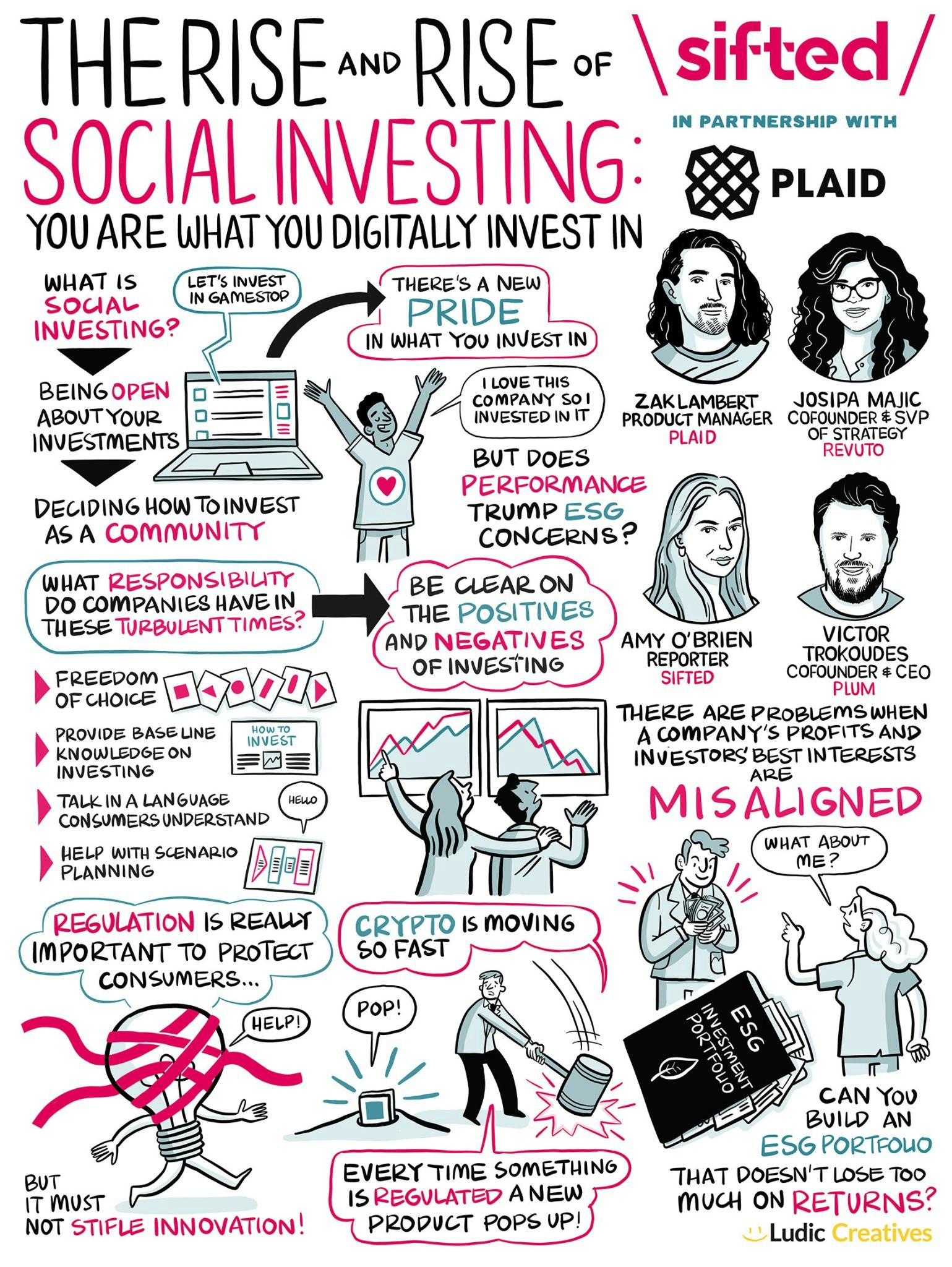Back in the day, investors had to dig through a company’s annual report to do their research — but now, more and more are turning to social media platforms like Twitter and TikTok for stock tips.
How has this changed the investment landscape? In our most recent Sifted Talks, our expert panel discussed how investment platforms can help people cut through the noise of social media and make good financial choices. Our experts were:
- Zak Lambert, product manager at Plaid, an open banking data network that powers fintech tools for global companies.
- Josipa Majic, cofounder and SVP of strategy at Revuto, which allows users to manage their subscriptions and payments.
- Victor Trokoudes, cofounder and CEO of Plum, a money growth and management app.
Here’s what we learnt.

1/ Social investing is not a new thing
Things like investment apps may have changed how people invest their money, but Trokoudes said people still use traditional platforms like WhatsApp and online forums to share their decision-making — so “social investing” has really been around as long as early internet forums.
But Majic said that investors’ behaviour has changed regarding how much — and how publicly — they share. Previously, investors would read company reports and make decisions relatively quietly. But now, younger investors want to own a piece of a company they love and tell everyone about it online — it’s become part of who they are.
The one thing that is new is that investing, and where you are investing, is part of your identity. We have new generations of people who are proud of what they are invested in and they talk about it" — Josipa Majic, Revuto
2/ 'Dumb' questions are allowed
Investors new to the game, and who are using social media to learn, may not be fully aware of the risks. So what steps should investment platforms take to ensure they’re not exploiting customers with little financial knowledge?
Lambert said investment platforms had to speak to people in a language that they understand to explain the potential consequences of their decisions. Beginners need to be able to ask “dumb” questions — like “what is a stock?” — on platforms like TikTok.
Majic said that many investors, including herself, suffered significant losses the first time they tried trading. They took time to research the market and educated themselves about investment before trying again. She added that there was a clear link between the addictive nature of gambling and risky investing, and investment platforms need to communicate clearly to counteract the loud messages on social media.
People will always want choice and it is our responsibility to give it to them. The question is how do you get people to learn? You can try and educate — you can give people different types of materials, but people learn by doing” — Victor Trokoudes, Plum
3/ Regulation isn’t always the answer
While investment platforms can help their customers navigate the markets safely, shouldn’t regulators also take some of the responsibility?
Trokoudes said novice investors cannot expect regulators to protect them from their own lack of knowledge, especially as regulators are often behind the curve themselves.
Majic added that once you start to heavily regulate a certain sector, investors often move their money to another sector with less regulation and it can be hard to keep up. She added that Europe has historically been good at regulation, but as we are living in a global market investors may participate in other markets without the same standards.
Lambert said the demonisation of regulators was unproductive and that watchdogs have the customer’s best interests at heart. Investment platforms need to realise that if a customer lives in a certain country, regulations of that country may still apply even if the company is based elsewhere.
For basically all of history, financial services have been super local and it has been local, because everything you need to do needs to be in person… The optimistic case for crypto is that a large portion of the economy was not built on the internet and physical constraints were in place that are no longer in place” — Zak Lambert, Plaid

4\ Look to the metaverse?
Companies are increasingly using the metaverse to sell products and experiences to users. The panel discussed how, in the future, investors could meet there to share stock tips or even make trades.
But Majic said while the metaverse could already be used to augment social interactions, it’s not certain when, or how much, it will truly change things. She added that Gen X and older millennials were more sceptical than younger generations as they’ve lived through the hype of similar technologies, like VR.
Lambert said the metaverse needed to prove its value for the community and the creators of investment platforms. He added that token-dated commerce — a method of protecting and identifying a transaction — could create the equivalent of a member’s-only club in the metaverse which may encourage social investing.
Crypto creates communities and those communities end up being quite successful. Token-dated commerce is a way to create and enforce those communities in the same way that a musician's audience can be closer to them because they can prove they were at a specific show” — Lambert
Like this and want more? Watch the full Sifted Talks here:



